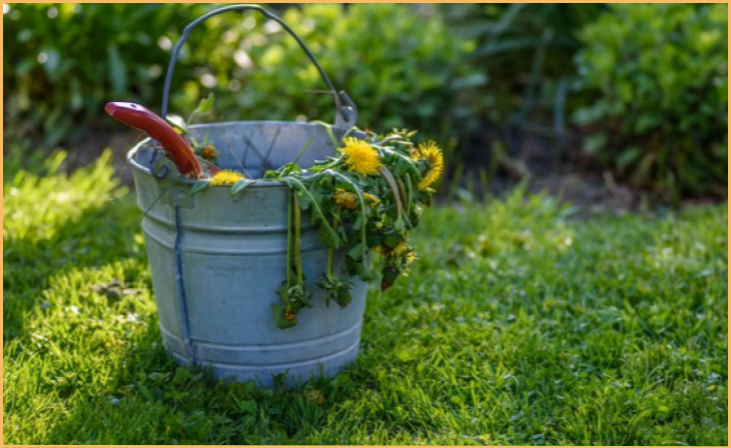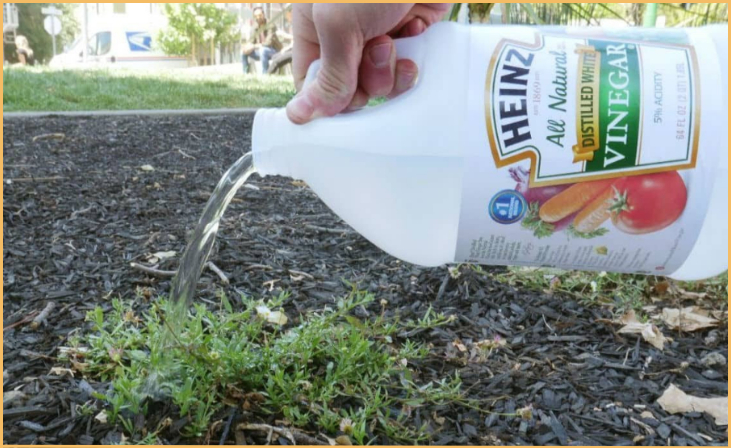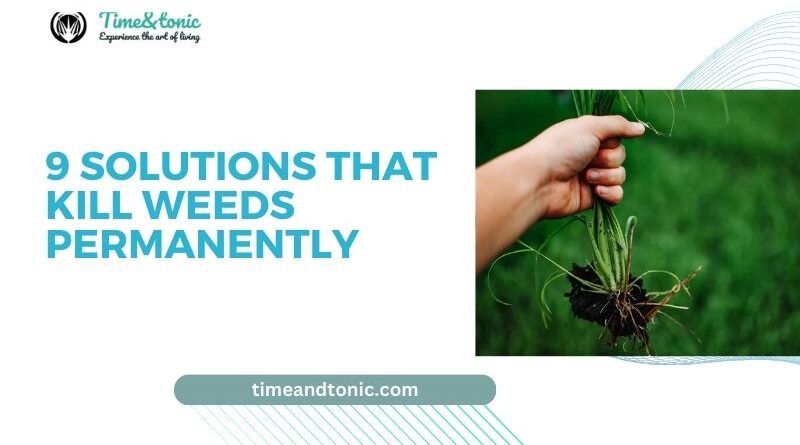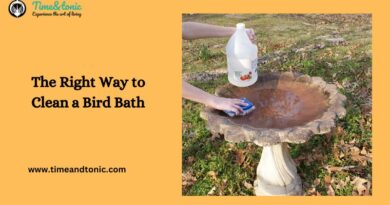9 Solutions that Kill Weeds Permanently
Kill Weeds Permanently – Weeds can be relentless invaders in your garden and landscaping, competing with your cherished plants for space, nutrients, and sunlight. Dealing with weeds can be a never-ending battle, but there are effective solutions that can help you win the war against these unwanted intruders. In this comprehensive guide, we’ll explore nine solutions to kill weeds permanently and restore the beauty of your outdoor spaces.
Solutions that Kill Weeds Permanently
1. Manual Removal

Manual Removal is a tried-and-true method for tackling weeds. Get down to ground level, wear gardening gloves, and pull weeds by hand, ensuring you remove the roots as well. For stubborn weeds, consider using a weeding tool. This approach prevents regrowth and is environmentally friendly.
Also Read: 8 Riskiest Beaches Worldwide: Know Before You Go
2. Mulch
Mulch is not only an excellent way to conserve soil moisture and regulate temperature but also an effective weed deterrent. Apply a thick layer (3-4 inches) of mulch around your plants and in garden beds. This helps smother weeds and blocks sunlight from reaching them, making it difficult for them to grow.
Mulch has additional benefits, such as improving soil quality as it breaks down and provides an aesthetically pleasing appearance to your garden. Choosing organic mulch, like wood chips or compost, can enhance these advantages while helping with weed control.
3. Boiling Water
For a simple and eco-friendly weed killer, try using Boiling Water. Carefully pour boiling water directly onto the weeds, which causes the plant cells to burst and wither. Be cautious not to splash boiling water onto desirable plants nearby.
This method is especially effective for weeds that sprout in cracks and crevices of driveways or walkways. It’s a quick and chemical-free way to eliminate weeds in areas where you want to avoid chemical exposure.
4. Vinegar

Vinegar, specifically undiluted white vinegar, is a natural weed killer. On a sunny day, spray the vinegar directly on the weeds. The acetic acid in vinegar disrupts the weed’s cell membranes, leading to its demise. Be careful not to spray it near plants you want to keep, as vinegar can be indiscriminate.
5. Salt
If weeds are sprouting in walkways or driveways, Salt can be an effective solution. Sprinkle salt directly on the weeds. Keep in mind that salt can harm the soil and surrounding plants, so use it sparingly and avoid applying it in garden beds.
Salt should be used with caution, as it can have a long-lasting negative impact on soil quality, making it difficult for desirable plants to grow. It’s best reserved for situations where other methods are less practical.
Also Read: 10 Best Groceries You Can Buy at Costco
6. Commercial Herbicides
Commercial Herbicides come in both selective and non-selective varieties. Selective herbicides target specific types of weeds, while non-selective ones kill all plants they contact. When using herbicides, follow the instructions carefully to ensure safe and effective application.
Non-selective herbicides like glyphosate can be highly effective but should be used sparingly and only as a last resort. They can harm beneficial plants and have environmental concerns associated with them.
7. Landscape Fabric
Landscape Fabric serves as a barrier to block weed growth. Place it under mulch in garden beds, and make sure to cut holes in the fabric to accommodate desired plants. This method effectively prevents weeds from taking root.
Landscape fabric is an excellent choice for areas where you want to completely suppress weed growth, such as under decorative rocks or gravel pathways. It’s also a good option for long-term weed control in larger garden areas.
8. Corn Gluten Meal
Corn Gluten Meal is a natural pre-emergent herbicide that inhibits the germination of weed seeds. Apply it in early spring before weeds have a chance to sprout. It’s an organic and environmentally friendly way to keep weeds at bay.
One of the advantages of corn gluten meal is that it’s a natural byproduct of corn processing, making it a sustainable choice for weed control. It also adds nitrogen to the soil, benefiting your existing plants.
9. Flame Weeding
Flame Weeding involves using a propane torch to heat weeds until they wither and die. This method is particularly effective for large areas, such as driveways or walkways, but should be used with caution to avoid fire hazards.
Flame weeding is a unique approach that offers rapid results and leaves no chemical residue behind. It’s best suited for areas where you don’t want to disturb the soil, such as in-between pavers or on gravel paths.
Choosing the Right Weed Control Method for Your Garden
Selecting the right weed control method for your garden depends on various factors, including the type of weeds you’re dealing with, the size of the area, and your environmental concerns. It’s often a good idea to use a combination of methods to achieve the best results.
For example, in your flower beds, you might start by manually removing weeds and then apply a thick layer of mulch to prevent further growth. In areas where weeds are persistent, consider using natural options like vinegar or corn gluten meal.
In hardscape areas like driveways and walkways, boiling water or salt may be the quickest and most effective solution. However, keep in mind that these methods can have long-term impacts on soil and surrounding plants, so use them judiciously.
For those who prefer a hands-off approach, landscape fabric can be a reliable choice, especially in large garden areas. It offers excellent long-term weed suppression without the need for frequent maintenance.
Also Read: 5 Largest Creatures Found in the Amazon
Additional Tips for Successful Weed Control
Here are some additional tips to help you successfully control weeds in your garden and landscaping:
- Regular Maintenance: Make weed control a regular part of your gardening routine. Regularly inspect your garden for new weed growth and address it promptly.
- Timing is Key: Apply weed control methods at the right time. For instance, use pre-emergent treatments like corn gluten meal before weeds have a chance to sprout.
- Use Protective Gear: When using herbicides or boiling water, wear protective gear such as gloves and eye protection to ensure your safety.
- Be Mindful of Beneficial Plants: Take care not to harm desirable plants while targeting weeds. Be precise when applying weed control measures.
- Combine Methods: Combine several weed control methods for a holistic approach. For example, manual removal followed by mulch application can be highly effective.
- Stay Informed: Stay informed about local regulations regarding the use of herbicides and other weed control methods. Some chemicals may be restricted in certain areas.
In conclusion, weeds can be a persistent nuisance in your open spaces, but numerous effective methods exist to combat them. Whether you prefer manual removal, eco-friendly solutions like boiling water and vinegar, or more robust options like commercial herbicides, there is a weed control method that suits your needs.
By employing these strategies, you can ensure the long-term health and beauty of your garden and landscaping, free from the encroachment of unwanted weeds. Choose the approach that aligns with your gardening philosophy and enjoy a weed-free outdoor oasis.
FAQs
While salt can be effective in killing weeds in hardscape areas like walkways, it’s not recommended for garden beds as it can harm the soil and surrounding plants. Use salt sparingly and with caution.
Some commercial herbicides can be harmful if misused or overused. It’s important to follow the product label instructions, wear protective gear, and avoid using them near edible plants. Consider eco-friendly alternatives like vinegar or corn gluten meal for a more environmentally conscious approach.




